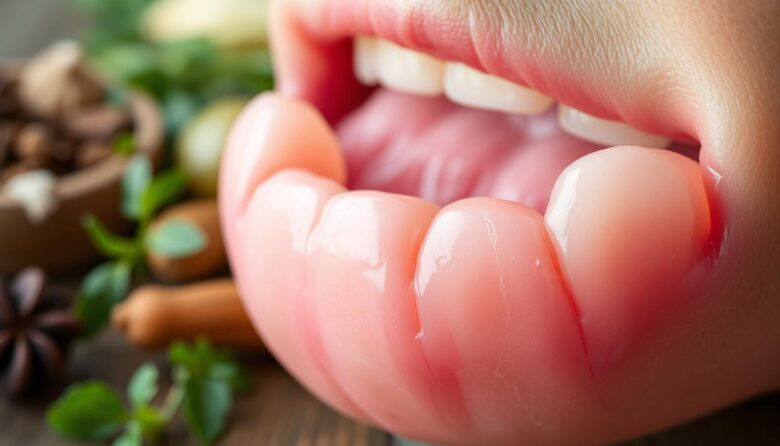Keeping your gums healthy is key to your overall health. It helps your teeth stay strong and your mouth clean. There are natural ways to boost your gum health, reducing the chance of dental problems. This article will explore different methods to care for your gums, from what you eat to your daily routine.
By using these natural strategies, you can keep your gums in top shape. This proactive approach helps prevent dental issues before they start.
Understanding Gum Health and Its Importance
Gums are key to keeping our mouths healthy. They do more than just hold our teeth in place. They protect the mouth’s inner structures. Knowing how important gums are helps prevent gum disease and improves our lives.
What are Gums and Their Role in Oral Health?
Gums, or gingiva, are soft tissues around our teeth. They act as a shield against bacteria and help keep teeth stable. Keeping gums healthy is crucial for good oral hygiene and function.
Common Signs of Gum Disease
Spotting gum disease early is important. Look out for these signs:
- Redness or swelling of the gums
- Bleeding while brushing or flossing
- Persistent bad breath
- Receding gums
Seeing these signs means you need to act fast to avoid bigger problems.
The Link Between Gum Health and Overall Well-being
Bad gum health can lead to serious diseases like heart disease and diabetes. Studies show gum inflammation is linked to body diseases. This shows gums are a key to our overall health. Good oral care and regular dental visits can boost gum health and overall well-being.
Natural Remedies for Healthier Gums
Looking into natural remedies for gum health offers great options. Many turn to herbal solutions as a better choice than regular products. This part talks about natural ways to keep your mouth clean, which is good for your gums.
Herbal Mouthwashes for Gum Care
Herbal mouthwashes are a great addition to your oral care. Ingredients like sage, peppermint, and chamomile fight inflammation and bacteria. They help reduce plaque and calm sore gums. Making your own mouthwash is easy:
- Mix one cup of water with a teaspoon of cayenne pepper and a teaspoon of salt.
- Swish the mixture in your mouth for a minute before spitting it out.
- Use this herbal mouthwash daily for the best results.
Benefits of Coconut Oil Pulling
Coconut oil pulling is an old practice that’s becoming popular again. It involves swishing coconut oil in your mouth for 10-20 minutes to remove bad bacteria. Doing this regularly can make your gums healthier. People say it reduces inflammation and makes teeth whiter.
Essential Oils That Promote Gum Health
Adding essential oils to your dental care can make it more effective. Oils like tea tree and clove oil kill bacteria. Using essential oils is simple:
- Add a drop of tea tree oil to your regular toothpaste.
- Mix a few drops of clove oil with a carrier oil and apply it to sore gums.
- Always dilute essential oils before use to avoid irritation.
Nutritional Changes to Support Gum Health
Proper nutrition is key for gum health. Making dietary changes can greatly improve gum condition. Knowing the role of nutrients like Vitamin C and the effects of certain foods helps make better choices for oral health.
Importance of Vitamin C for Gums
Vitamin C is vital for gum repair and maintenance. A lack of it can weaken gums and make them more prone to disease. Eating foods high in Vitamin C, like oranges, strawberries, and bell peppers, is important for gum health.
Foods to Avoid for Better Gum Health
Identifying foods that can harm gums is crucial. Some foods can cause inflammation and dental problems. It’s best to limit:
- Sugary snacks and candies
- Processed foods high in additives
- Excessive acidic foods and beverages
Staying away from these foods can help keep gums healthy and prevent gum diseases.
Incorporating Fiber-Rich Foods
Fiber-rich foods are good for gum health. They help produce saliva, which cleans teeth naturally. Foods like apples, carrots, and leafy greens act as natural toothbrushes, removing plaque. Eating these foods regularly supports gum and oral health.
Daily Habits That Promote Gum Health
It’s important to have daily habits for gum health to keep your mouth healthy. Brushing and flossing regularly helps stop plaque and keeps gums healthy. Also, don’t forget to see your dentist for check-ups.
The Role of Regular Brushing and Flossing
Brushing your teeth twice a day and flossing daily is key for good oral health. These habits remove food and plaque, which helps avoid gum disease. Using fluoride toothpaste also strengthens your teeth and prevents cavities.
How to Properly Brush and Floss
To get the most out of brushing and flossing, follow these steps:
- Use a soft-bristled toothbrush and brush gently in circular motions.
- Brush for at least two minutes, making sure to cover all tooth surfaces.
- Floss before brushing to remove food stuck between teeth.
- Slide the floss between teeth, curving it around each tooth in a C shape.
Importance of Routine Dental Check-ups
Regular dental visits, every six months, are crucial. They help check gum health and catch problems early. Professional cleanings remove tartar that brushing can’t. These visits also let dentists give advice on improving your oral care routine.
Stress Management and Gum Health
It’s important to understand how stress affects our gums. Stress can cause inflammation, which harms gum tissue. So, managing stress is key to keeping our gums healthy.
When we’re stressed, it’s crucial to find ways to reduce its impact on our mouth. This helps prevent gum disease and keeps our gums strong.
Connection Between Stress and Gum Disease
Stress and gums are closely linked. High stress can lead to bad habits like teeth grinding or ignoring oral care. This increases the risk of gum disease.
Stress can also cause inflammation, which weakens gums. This makes it vital to manage stress to protect our gums.
Techniques for Reducing Stress
Adding stress-reducing activities to our daily lives can boost our health, including our gums. Here are some effective methods:
- Yoga: It combines movement, breathing, and meditation to reduce stress and relax.
- Meditation: It helps us stay present, lowering anxiety and enhancing emotional well-being.
- Regular Physical Activity: Exercise releases endorphins, which are natural stress fighters and mood boosters.
Mindfulness Practices for Oral Health
Mindfulness can greatly benefit our gums by managing stress. Simple acts like deep breathing or guided imagery can calm our minds. These practices also help us focus on oral care, supporting gum health.
By staying calm, we can better handle stress and protect our gums. This is a win-win for our overall health.
The Impact of Smoking on Gum Health
Smoking harms gums, leading to serious dental problems like periodontitis and gum recession. Studies show smokers are more likely to get gum disease because of tobacco’s harmful chemicals. These chemicals block blood flow to the gums, making healing and growth hard.
It’s important to understand how smoking affects gums for those wanting to improve their gum health.
How Smoking Harms the Gums
Smoking’s main problem is its damage to gum tissues. Cigarettes contain chemicals that can destroy gum tissue, causing inflammation and infections. Smokers often see gum disease get worse faster, making it key to catch these problems early.
The mouth of a smoker is more likely to get infected with bacteria. This creates a cycle of decay that’s hard to break.
Steps to Quit Smoking for Better Gums
Quitting smoking is crucial for better gum health. Here are some steps to consider:
- Identify personal triggers that lead to smoking.
- Create a detailed plan outlining quit dates and methods.
- Seek professional guidance, such as counseling or nicotine replacement therapies.
- Surround oneself with supportive family and friends to foster a positive environment.
- Track progress and celebrate small victories along the way.
Support Systems for Smoking Cessation
Support systems are key for quitting smoking. You can find many resources, including:
- Hotlines specifically focused on smoking cessation.
- Local support groups that provide encouragement and shared experiences.
- Mobile apps designed to monitor progress and offer tips.
- Online forums or communities that facilitate discussion and accountability.
Hydration’s Role in Oral Health
Hydration is key for good oral health. It helps keep gums healthy by supporting saliva production. Saliva cleanses the mouth, removing food and bacteria that harm teeth and gums.
How Water Affects Saliva Production
Drinking enough water helps the body make enough saliva. Saliva fights acids and prevents tooth decay and gum disease. It also starts digestion and breaks down food for easier swallowing.
Without enough water, saliva production drops. This leads to dry mouth, which bacteria love. It’s a bad place for your teeth and gums.
Recommendations for Staying Hydrated
Staying hydrated is more than just drinking when you’re thirsty. Here are some tips to help:
- Drink at least eight 8-ounce glasses of water daily.
- Carry a reusable water bottle to encourage frequent sips throughout the day.
- Add fruits like watermelon, oranges, and cucumbers for their high water content.
- Set reminders on phones or smart devices to drink water regularly.
Signs of Dehydration to Watch For
Knowing the signs of dehydration is important for gum health. Look out for:
- Dry mouth or cracked lips
- Increased thirst or a persistent feeling of dryness
- Dark yellow urine or infrequent urination
- Fatigue or dizziness
Seeing these signs early can help avoid gum problems. Drinking enough water keeps your gums and overall health in check.
The Benefits of Probiotics for Gum Health
Probiotics are key for keeping gums healthy. They help balance the good and bad bacteria in our mouths. This balance is crucial for good oral hygiene and fighting off gum disease.
Understanding Oral Probiotics
Oral probiotics are made for our teeth and gums. They are different from probiotics for the gut. These special probiotics live in our mouths and fight off bad bacteria. Adding them to our daily routine can greatly improve gum health.
Best Probiotic Foods for Gum Care
Choosing the right foods can help a lot with gum care. Here are some top picks:
- Yogurt: It’s full of live cultures that are great for our teeth.
- Kimchi: This fermented food has good bacteria that helps our gums.
- Kombucha: It’s a tasty way to get probiotics into our diet.
These foods not only help our gums but also boost our mouth’s immune system.
How Probiotics Help Balance Oral Microbiome
Studies show that probiotics are very good for our gums. They keep the bad bacteria from growing and causing gum disease. By doing this, they help our gums stay healthy and our mouths feel fresh.
The Importance of Mineral Intake
Minerals are key for keeping gums healthy. Knowing how minerals help gums can improve your oral health. Calcium and magnesium are especially important. They help keep gums strong and prevent diseases.
Key Minerals for Gum Health
Calcium and magnesium are vital for gum health. Calcium makes bones and gums strong. Magnesium helps keep gum tissues healthy and prevents inflammation.
Best Sources of Calcium and Magnesium
Eating foods rich in these minerals can boost gum health. Great sources include:
- Dairy products like milk and yogurt
- Leafy greens such as spinach and kale
- Nuts, especially almonds and walnuts
- Seeds, including chia and flaxseeds
- Whole grains, like brown rice and oats
How to Balance Mineral Consumption
It’s important to balance minerals in your diet for gum health. Eating a variety of foods with enough calcium and magnesium is key. Watching what you eat can help spot any mineral gaps. This can lead to better oral health.
Long-term Strategies for Maintaining Gum Health
Keeping your gums healthy takes a long-term effort. It’s important to make a routine that works for you. This means brushing and flossing every day and seeing your dentist regularly.
By doing these things, you’re taking care of your gums. This helps keep them healthy for a long time.
Creating a Sustainable Oral Hygiene Routine
Choosing eco-friendly dental products is good for your gums and the planet. Using bamboo toothbrushes and natural toothpaste is a great start. It shows that caring for your teeth can also help the environment.
This way, you’re not just taking care of your gums. You’re also making a positive impact on the world.
Importance of Environmental Considerations
Teaching kids about gum health is very important. Starting them early on good dental habits is key. It helps them develop a lifelong commitment to oral care.
By teaching them to brush, floss, and eat healthy, you’re setting them up for success. This way, they’ll grow up valuing good dental hygiene.




